Outspoken royals don't hide sympathies over Ukraine
- Published
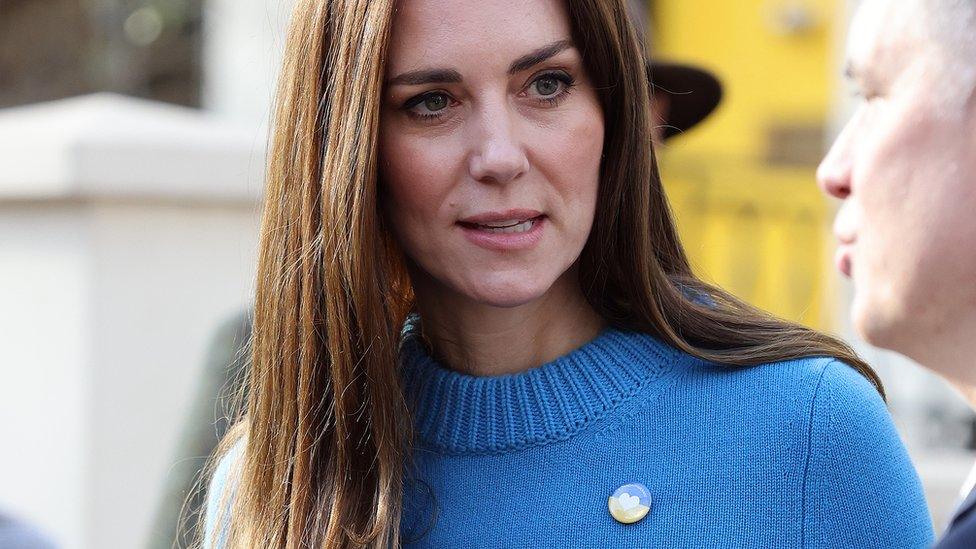
The Duchess of Cambridge wore a Ukraine badge on a visit on Wednesday
With flowers, prayers, colour co-ordination and a few verbal punches, the Royal Family have been unusually outspoken about the Ukraine war.
They've made a blue-and-yellow flurry of appearances and interventions, with less of the typical neutrality or diplomatic politeness.
Prince William and Kate, the Duchess of Cambridge, have publicly backed President Zelensky and Ukraine's people as "they bravely fight".
When the royal couple visited the Ukrainian Cultural Centre in London on Wednesday they were literally not hiding their colours, both wearing badges with the Ukrainian flag and dressed in shades of blue.
'Brutal aggression'
"We are in solidarity with all those who are resisting brutal aggression," said Prince Charles last week, in direct language that ditched the usual royal ambiguities. He didn't pull any punches.
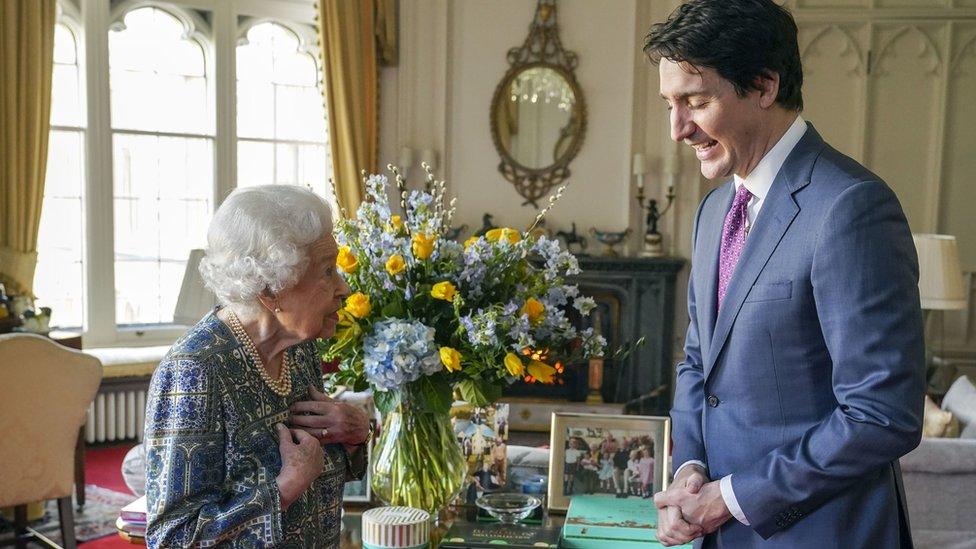
In case anyone missed the point, the following day Prince Charles condemned the "truly terrible aggression" facing Ukraine, on a visit to the Ukrainian Catholic Cathedral.
Prince Charles and Camilla, the Duchess of Cornwall, seemed moved by their meeting with the Ukrainian community and promised to pray for them in this current emergency.
The royals reach a global audience - and Prince Charles's unexpectedly strong warning about the attack on democratic values was extensively covered across the US media.
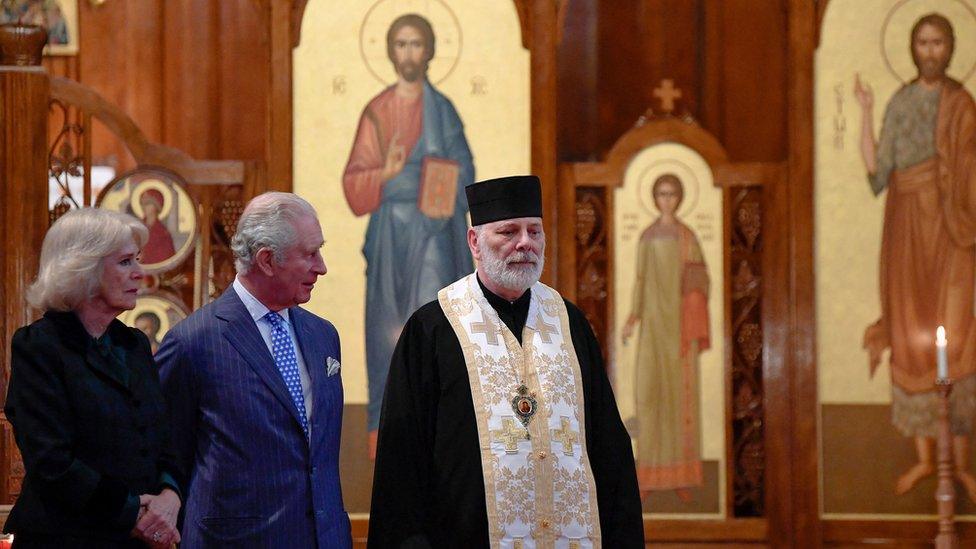
Prince Charles and Camilla condemned the aggression towards Ukraine on a visit to the Ukrainian Catholic Cathedral
He probably got more international column inches on this than the prime minister.
Royal visits and interventions for causes are usually cautious and far apart, like occasional phone calls from caring but distant relatives. But Ukraine has prompted a stream of contacts.
Saying it with flowers
The Queen has spent her long reign avoiding direct comments on political matters.
So there was much speculation about the surprisingly big bunch of flowers, in the Ukrainian colours of blue and yellow, that appeared when she met Canadian prime minister Justin Trudeau.
It was subtle, unspoken and unmissable.
Was it a colour-coded message? Buckingham Palace insiders suggest that little in the royal world is ever accidental. Like the symbolism of medieval court paintings, everything about the Queen's appearances has its own message.
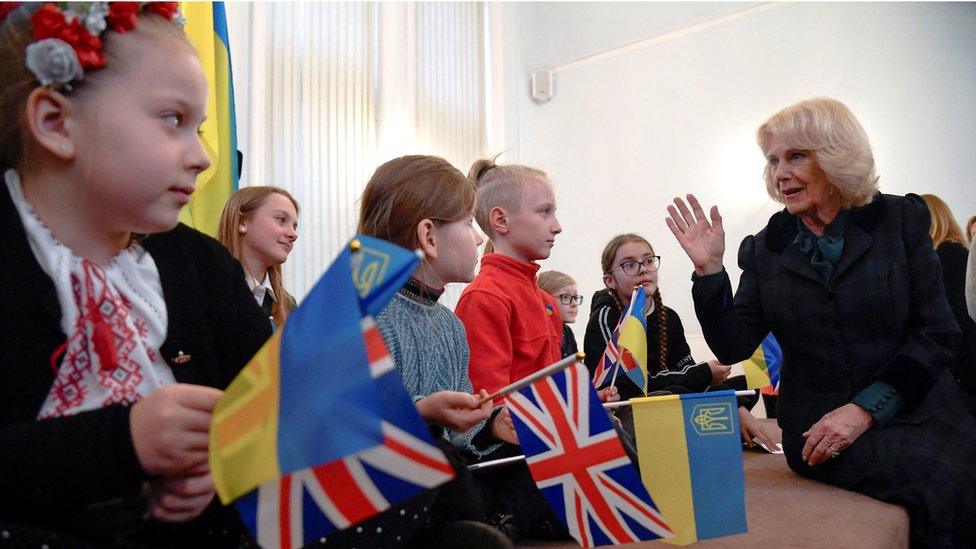
Camilla met children from the Ukrainian community in London
It's not unusual for the Royal Family to show support after a natural disaster or humanitarian emergency.
And the Queen, the Prince of Wales and the Duke of Cambridge have all chipped in to the UK Disasters Emergency Committee (DEC) appeal to help Ukrainians fleeing the conflict.
But this has been a political crisis, an invasion of a country, and the royals have been ready to show their support and outrage and kept little hidden about their sympathies.
It has allowed them to voice the concerns of the public, to assert values, in a non-party political way and to show the statesmanship and seriousness of the royal role. It also shows it's not all about hats and sex scandals.
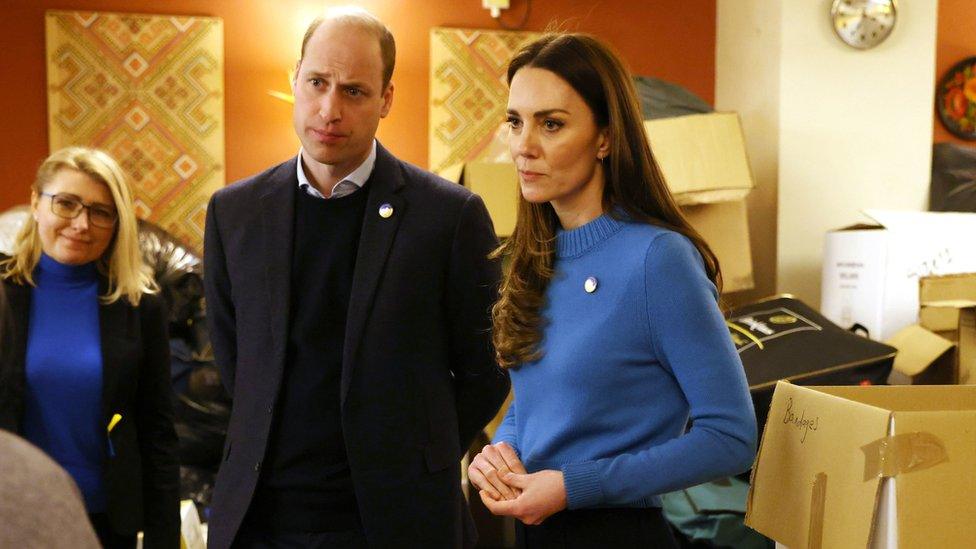
Prince William and Kate visited the voluntary support for Ukraine at the Ukrainian Cultural Centre
But nothing is without complications. The Edward VII Hospital in London, used by the royals, has a new unit, the Kantor Medical Centre.
It's been funded by a donation from the Kantor Charitable Foundation, set up by a Russian-born billionaire, Viatcheslav Kantor, with pictures of him with President Putin on the foundation's website.
"We share the deep concern felt by people across the world at the invasion of Ukraine," said a statement from the hospital, which said it had accepted the donation in 2018 from the UK-registered charity. Dr Kantor is not on a sanctions list.
The Royal Family is also an international family. When the Queen marked the start of the Platinum Jubilee last month she looked at historic items from previous jubilees.
She showed particular interest in Queen Victoria's "autograph fan" signed by other royal relatives, including "Nicky". That was Nicholas II, the ill-fated future ruler of Russia, toppled after a war.

War in Ukraine: More coverage
OCCUPIED CITY: 'We are not co-operating'
RUSSIA MOTHERS: 'How do I get my soldier son back?'
EXPLAINED: Why Putin has invaded Ukraine?
IN DEPTH: Full coverage of the conflict
